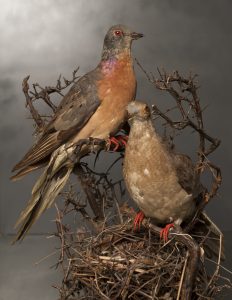
Florida Museum of Natural History photo by Jeff Gage
GAINESVILLE, Fla. — A Florida Museum of Natural History gallery exhibit opening Sept. 1 illustrates how human actions can lead to the extinction of a species—even those considered common just a century ago.
“A Shadow Over the Earth: The Life and Death of the Passenger Pigeon” marks the 100-year anniversary of the bird’s extinction, and features illustrations, artwork and poetry from famed naturalists who documented the pigeon’s biology and its decline. Visitors may also learn about related Florida Museum research and view a well-preserved pair of Passenger Pigeons mounted in the 1890s.
Prior to its extinction 100 years ago, the Passenger Pigeon was one of the most abundant birds in the world, with population estimates ranging from 3 billion to 5 billion.
“James Audubon witnessed a flock that took three days to fly over a locality in north central Kentucky,” said Jessica Oswald, a former Florida Museum ornithology graduate student.
The populous pigeons couldn’t survive large-scale commercial hunting and habitat loss, however. The world’s last Passenger Pigeon, named Martha, died in the Cincinnati Zoo and Botanical Garden on Sept. 1, 1914, at 29 years old.
“Museum scientists have been studying endangered and extinct birds around the world for 20 years,” Florida Museum exhibit developer Tina Choe said. “We’re very excited to highlight the Passenger Pigeon story because understanding the past is one key to a better future.”
The exhibit explains how the loss of the Passenger Pigeon changed social attitudes and spurred new legislation protecting migratory birds, which played a part in saving other species from the same fate. It takes more than laws to conserve wildlife, however, so visitors may learn in the exhibit what small, easy steps they can take to protect Florida’s native birds.
The museum will display the exhibit through Feb 1, 2015.
For more information, visit http://www.floridamuseum.ufl.edu/exhibits.
-30-
Writer: Rosanna Del Cioppo, rdelcioppo@ufl.edu
Source: Tina Choe, tchoe@flmnh.ufl.edu, 352-273-2079
Media Contact: Paul Ramey, pramey@flmnh.ufl.edu, 352-273-2054